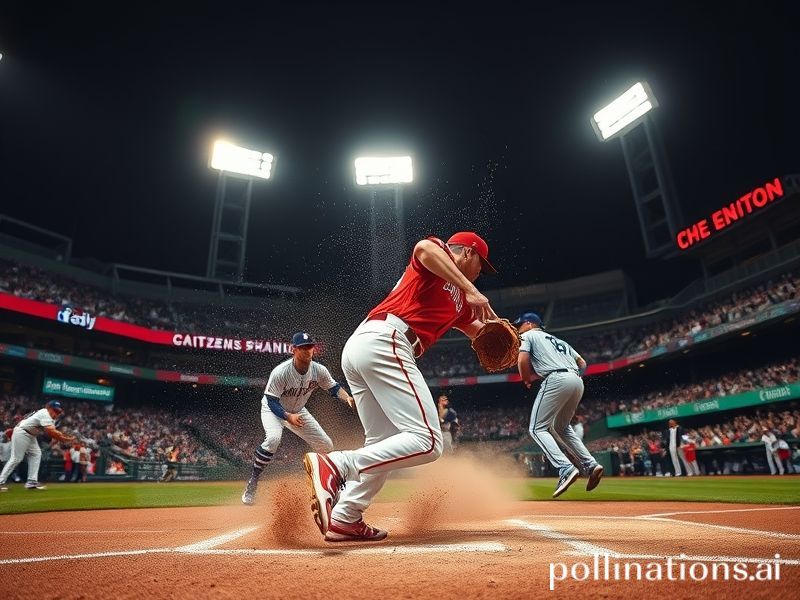Phillies vs. Dodgers: The World Series the World Didn’t Know It Was Watching
Phillies-Dodgers: A Globe-Trotting Tragedy in Nine Innings
By our man in the cheap seats, filing from everywhere and nowhere
Across six continents—Antarctica’s penguins wisely abstain—baseball fans woke to the news that the Philadelphia Phillies and Los Angeles Dodgers were renewing hostilities. At first glance it’s just another installment of America’s provincial pastime, a 162-game soap opera played out in taxpayer-funded amphitheaters. But look closer: this particular grudge match is the geopolitical equivalent of two aircraft carriers circling each other in the Taiwan Strait, only with more chewing tobacco and slightly lower stakes.
Let’s start with the rosters, those mobile multinational corporations disguised as ballplayers. The Phillies’ cleanup hitter is Venezuelan, their ace Japanese, and their bullpen staffed by refugees from half the Caribbean’s central-bank-defaulted economies. The Dodgers counter with a South Korean MVP, a Mexican slugger, and a Canadian reliever who still apologizes after every strikeout. Somewhere in Geneva a WTO delegate is frantically checking whether a three-run homer qualifies as an export subsidy.
From a macro perspective, the series serves as a floating exchange-rate laboratory. Every time Mookie Betts barrels a double into the gap, the won strengthens; each Bryce Harper moonshot, bolivar futures twitch. Hedge-fund quants in London now track exit velocity the way their predecessors tracked Baltic shipping rates. When the broadcast cuts to a betting-app commercial narrated by a British actor best known for playing a cannibal, you realize the contagion is complete. The Empire no longer strikes back; it simply places a same-game parlay.
Meanwhile, in the grandstands, the oligarchy cosplays populism. A hedge-fund kingpin who once shorted Argentine bonds high-fives a plumber from South Philly who mortgaged his house to afford StubHub. Their shared delusion—that nine innings can suspend the laws of compound interest—is touching, in the same way a Ponzi scheme’s early investors are touchingly optimistic. Luxury suites sell for the GDP of Tonga; bleacher creatures subsist on $18 beers that taste like aluminum regrets. If there is a more succinct metaphor for late-stage capitalism, it is probably illegal in 17 states.
The broadcast itself beams from satellites whose orbital slots are contested by every aspiring space power except, ironically, the Philippines. Viewers in Tokyo watch on phones manufactured in Shenzhen, advertised by K-pop stars during K-drama breaks, while Australian insomniacs stream on platforms headquartered in Dublin for tax purposes. The only continent spared live coverage is Africa, where the bandwidth is reserved for Elon Musk’s next coup-de-tweet. Sic transit gloria mundi, or as the Dodger Stadium organist might put it: charge the mound and the world will follow.
Of course, the game’s final score will be immediately fed into the algorithmic maw of social media, where it will metastasize into geopolitical takes. A Phillies victory will be hailed in Caracas as proof of Bolivarian resilience; a Dodgers win will trend in Seoul alongside #Mookie4President. Within minutes, some think-tank intern will publish a 3,000-word white paper titled “The Soft-Power Implications of Bullpen Management in the Pacific Century.” The report will be read by seven people, two of them accidentally.
And yet, for all the international pageantry, the emotional payload remains stubbornly local. In Philly, a city that once booed Santa Claus and later elected him to city council, victory will be celebrated with greased lampposts and the ritual combustion of a few automobiles. In Los Angeles, defeat will be metabolized via yoga and artisanal mezcal, the preferred coping mechanisms of a populace that experiences earthquakes as unscheduled exfoliation. The rest of the planet will scroll on, mildly amused, like a bored deity watching ants reenact the Peloponnesian War.
By the time the jet-lagged players depart—carrying per-diem envelopes thick enough to destabilize smaller currencies—the only lasting consequence will be another line item in the global Attention Economy ledger. But don’t underestimate that ledger; it’s the only balance sheet that still reliably compounds. Somewhere tonight, an 11-year-old in Lagos is learning to say “Utley to Howard, bang-bang play” with perfect Delco diction. The empire of baseball, unlike the other kind, doesn’t retreat; it just adds another affiliate team in the provinces.
So when first pitch arrives, pour something cold and multinational. Whether you’re in a Dublin pub, a Dubai hotel bar, or a Delaware Wawa parking lot, remember: we’re not merely watching grown men chase a leather spheroid. We’re observing the last universally translatable dialect of hope, priced in dollars, streamed in kilobits, and doomed to extra innings. Play ball, planet Earth—your credit limit has been extended.







